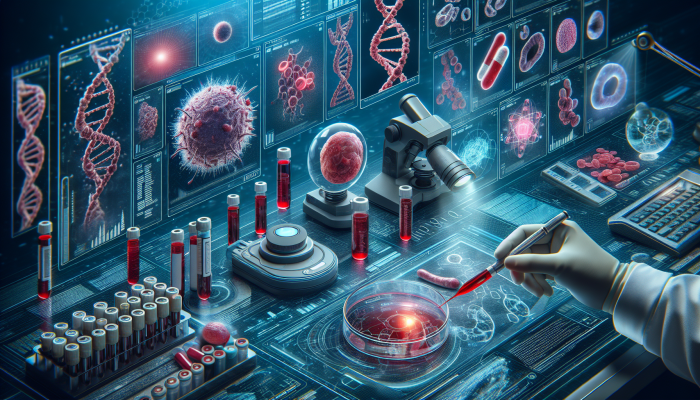Transforming Cancer Detection: The Revolutionary Effects of Cutting-Edge Blood Tests and Advanced Technologies
The landscape of cancer detection is experiencing an extraordinary evolution, driven significantly by advancements in blood tests for cancer risk. These innovative tests represent a major breakthrough in identifying potential cancer markers within the human body, which facilitates earlier interventions and greatly improves patient outcomes. To effectively navigate the complex and often overwhelming world of cancer diagnostics, it is crucial to develop a comprehensive understanding of the fundamental principles behind these tests, as well as the latest pioneering innovations that are emerging in this vital sector of healthcare. Staying informed about these advancements can empower patients and healthcare providers alike to make more informed decisions regarding cancer management.
Diving Deep into the Science of Blood Tests for Cancer Risk: Comprehensive Insights

At the core of blood tests for cancer risk lies the critical identification of specific biological indicators known as biomarkers. These biomarkers are essential signals that can indicate the presence of potential cancer or an increased risk of developing it in the future. They encompass a wide range of substances, including proteins, genes, and various other materials produced either by cancerous cells or by the body’s immune response to the presence of cancer. The scientific principles that underpin these innovative tests depend on advanced methodologies that effectively detect these biomarkers, employing a variety of cutting-edge technologies designed to enhance the accuracy of cancer diagnostics.
Among the primary methodologies used in these evaluations is the liquid biopsy. This innovative technique involves the analysis of a blood sample to identify components such as circulating tumor DNA (ctDNA) and circulating tumor cells (CTCs). The non-invasive nature of this approach allows for a comprehensive assessment of a patient’s cancer risk without the need for more invasive procedures like traditional biopsies. In addition, advancements in technology, particularly in next-generation sequencing (NGS), have significantly enhanced the sensitivity and specificity of these tests, making it possible to detect even the smallest traces of ctDNA, thereby improving early detection efforts.
The accuracy of blood tests for cancer risk is closely linked to our understanding of cancer biology. Different types of cancer release unique biomarkers into the bloodstream, driving ongoing research to discover new markers that could act as early warning signals. For example, levels of prostate-specific antigen (PSA) are commonly monitored to assess prostate cancer risk, while the CA-125 marker is frequently associated with the detection of ovarian cancer. This ongoing research is critical to enhancing our ability to detect cancers earlier, potentially leading to better treatment outcomes.
Moreover, the integration of artificial intelligence (AI) in the analysis of test results is significantly reshaping this field. AI algorithms have the capability to analyze vast datasets, uncovering patterns that may be overlooked by human analysts, thereby greatly improving the predictive power of these diagnostic tests. This integration of technology not only enhances accuracy but also streamlines the diagnostic process, making it more efficient and effective.
Uncovering the Cutting-Edge Innovations in Blood Tests for Cancer Risk: Major Breakthroughs
The field of blood tests for cancer risk is currently witnessing extraordinary innovations that could redefine cancer screening and prevention strategies. A particularly notable advancement is the introduction of multi-cancer early detection (MCED) tests. These groundbreaking tests are designed to identify multiple types of cancer from a single blood sample, thereby significantly reducing the need for invasive procedures and enhancing the overall comfort and experience of patients undergoing testing.
Recent studies demonstrate that MCED tests can effectively detect cancers at their earliest stages, often prior to the emergence of clinical symptoms. This early detection is paramount, as it is directly linked to improved treatment outcomes and higher survival rates. For instance, a notable study published in a leading oncology journal highlighted the exceptional capacity of an MCED test to identify malignancies that are typically difficult to diagnose early, such as pancreatic cancer and ovarian cancer, marking a significant advancement in the fight against these aggressive forms of cancer.
Another significant development in this area involves the analysis of methylation patterns found in circulating DNA as a diagnostic tool. Changes in methylation often indicate cancerous processes, prompting researchers to investigate how these patterns can be utilized for more accurate cancer risk assessment. This cutting-edge technique has the potential to offer a highly sensitive method for detecting malignancies where effective screening protocols are currently lacking, thus significantly improving patient care and outcomes.
Furthermore, partnerships between technology companies and healthcare providers are driving the creation of innovative diagnostic tools. These collaborations aim to leverage big data and machine learning to enhance blood sample analysis, resulting in more accurate risk assessments and tailored management strategies for patients, ultimately leading to better healthcare outcomes.
Investigating the Transformative Influence of Liquid Biopsies on Cancer Detection and Treatment Strategies
Liquid biopsies represent a revolutionary advancement in the domain of blood tests for cancer risk. Unlike traditional biopsies that require invasive tissue samples, liquid biopsies offer a minimally invasive alternative that can be performed multiple times, enabling continuous monitoring of cancer progression or responses to treatment. This capability is especially advantageous for patients who may not be suitable candidates for surgical biopsies due to various health concerns, allowing for better management of their condition.
Liquid biopsies function by isolating and analyzing ctDNA or CTCs derived from a blood sample. The ability to monitor these cellular components provides valuable insights into tumor dynamics and potential genetic mutations that may occur throughout the disease trajectory. For example, identifying specific mutations can help oncologists select targeted therapies, thereby personalizing treatment plans for improved therapeutic effectiveness and success rates.
The integration of liquid biopsies into clinical practice is already yielding promising results. Recent clinical trials have revealed that these tests can detect recurrences in patients who have previously undergone cancer treatments, often several months before conventional imaging techniques would identify them. This timely detection allows for swift interventions, ultimately enhancing survival outcomes and improving overall patient health.
Additionally, liquid biopsies facilitate real-time monitoring of treatment responses. By evaluating ctDNA levels during therapy, healthcare professionals can assess the effectiveness of the treatment regimen and make necessary adjustments to optimize patient care. This proactive approach to monitoring signifies a substantial shift towards a more dynamic and responsive management of cancer care, ensuring that patients receive the most appropriate treatment tailored to their specific needs.
In summary, blood tests for cancer risk, especially through the use of liquid biopsies, are transforming the field of oncology. Their potential for early detection, ongoing disease monitoring, and personalized treatment strategies positions them as invaluable resources in the ongoing battle against cancer. As research continues to evolve and technological advancements unfold, the future prospects for these tests to enhance patient outcomes and reshape cancer care are exceptionally promising and inspiring.
Engage with Us: Join Our Facebook Community for the Latest Updates and Insights!

This Article Was First Published On https://bloodtest.co.uk
The Article: Blood Tests for Cancer Risk: Pioneering Early Detection Methods appeared first on: https://ezbloodtest.com
The Article Cancer Risk Blood Tests: Innovative Methods for Early Detection Was Found On https://limitsofstrategy.com


No responses yet